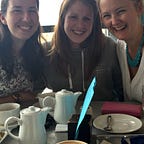New technology doesn’t have to be hard
Especially if you co-design it with the people who use it.
Thousands of people across England and Wales volunteer everyday to help people in their communities in real need.
They don’t volunteer to spend hours writing up notes into our case management system and they certainly don’t volunteer to use complex technology that’s hard to learn and slow to use.
That’s why, by the end of the year, every Citizens Advice adviser, receptionist, specialist adviser and researcher (all 23,000 of them) will use our new case management system — Casebook. We designed and tested it with the people that will use it to support clients.
We originally got it wrong
Casebook isn’t the first tool we’ve used to record information about the problems people come to us with. For years we’ve known just how important keeping this data is. Not only does it mean we can offer ongoing support to the people we see but it means we can check that the advice we’re giving them is right and delivered in the best way possible. We also use it to spot patterns, along with wider research, to seek out and fix issues that are systemic.
Previous versions of our case management tools were complicated to learn. User experience was awful. Our most recent, Petra, has over 3,800 input fields and several different ways to save data. It opens new tabs with each link you click and only works in internet explorer.
How did it go so wrong? We did the right thing when we started. We went out to find what our users needed. Then we disappeared behind closed doors and built all the features requested all at once.
A couple of years later we were ready to launch it but didn’t leave time for testing. Within minutes of going live we knew it wasn’t good enough. This new technology we’d handed to our advisers was hard and uncomfortable. Time advisers could have spent helping people solve their problems was spent in back offices trying to find the best way to record information.
How we made technology easy
This time we took a different approach.
Again, we spent time with our users to find out what they needed to help them do their job. They told us they wanted a tool that was fast, robust, powerful and easy to use along with a whole list of things it needed to do.
This time we didn’t retreat behind closed doors. Instead we built a bit and then tested it with users and made it better.
Over the last 2 years thousands of advisers and other users from across England and Wales helped us build Casebook. We heard from people that find new technology a challenge and others who find it easier to give it a go. They told us where we got it right and were clear where we got it wrong.
Getting people to use it
The team in the Citizens Advice office in Bedworth were some of the first people to use it. In a town of 32,000 people they see on average 220 a week.
“We’re always busy” said Deputy Chief Officer Denise Wilson. “Today our doors have been open 90mins and we’ve given 22 people full advice already. So anything that makes it easier for our advisers is a must.”
Each day there’s a team of about 14 volunteers in Bedworth. Keen both to get on and help people and looking forward to saying goodbye to the old case management system.
“The old one was just too hard to learn. It took me ages to do anything” said Sylvia a regular Monday volunteer.
“Today is the first day of Casebook everyone, time to say goodbye to Petra” called Denise as advisers gathered for their daily pre-meet at 9:50. “We’re a little part of history but expect there to be a few glitches- we’re helping make sure it works well for everyone else in Citizens Advice”.
As the day got going and advisers sat down to write up cases there was a sense of calm. Volunteers and staff, some tech savvy, others slightly less sure worked their way through the write up on Casebook.
Few queries cropped up. Cases and details were saved. There was a general sense of comfort and surprise at how straightforward it was.
Dennis an adviser for 10 years with a background in engineering said, “ I don’t really want to spend a lot of time writing up all the details but I know it’s important for funding — this is good. It seems quicker”
By the end of the session there was a feeling of normality — Casebook seemed to fit neatly into their day and the work they did. Between them they’d written up 50 cases notes and seen over 30 clients in the 4 hours they’d been open.
“I was nervous when I came in this morning,” said Sylvia a volunteer adviser. “I’d only had one training session, but I thought I’d just give it a go and see how I get on. And do you know- I could just do it. It’s great”
It was a move to new technology that was undramatic, straightforward and satisfying.
It highlights that when you co-design technology with the people using it and are prepared to keep testing and improving you can create something that people can use regardless of their digital capability.
